#read indigenous literature
Text

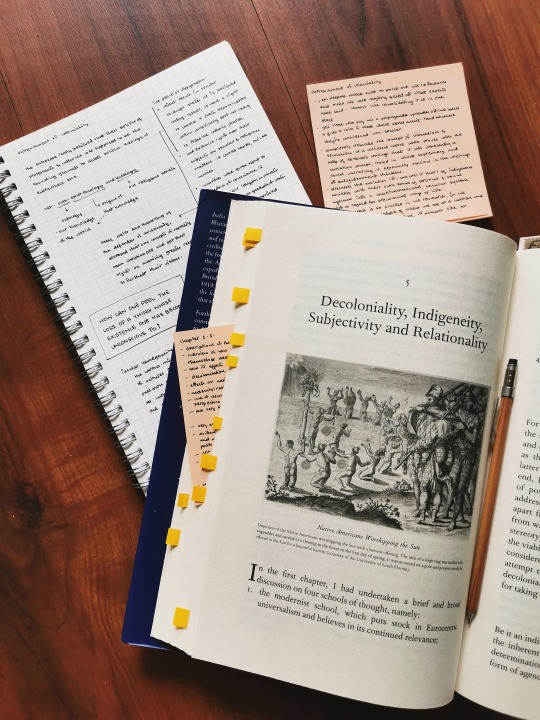
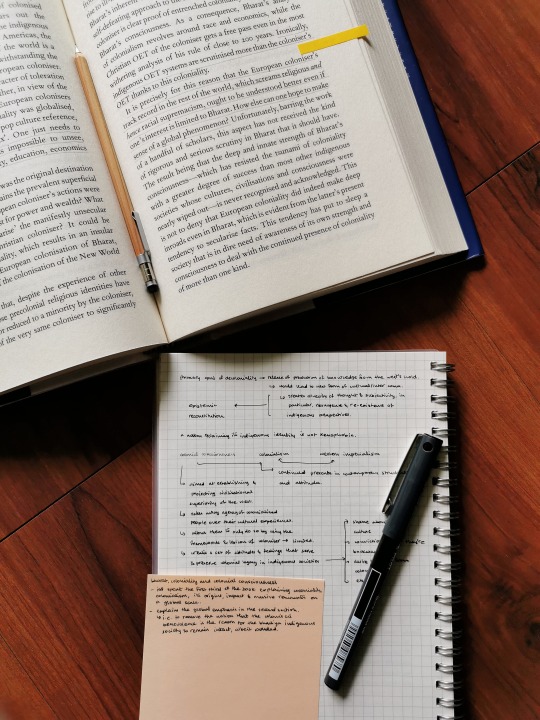
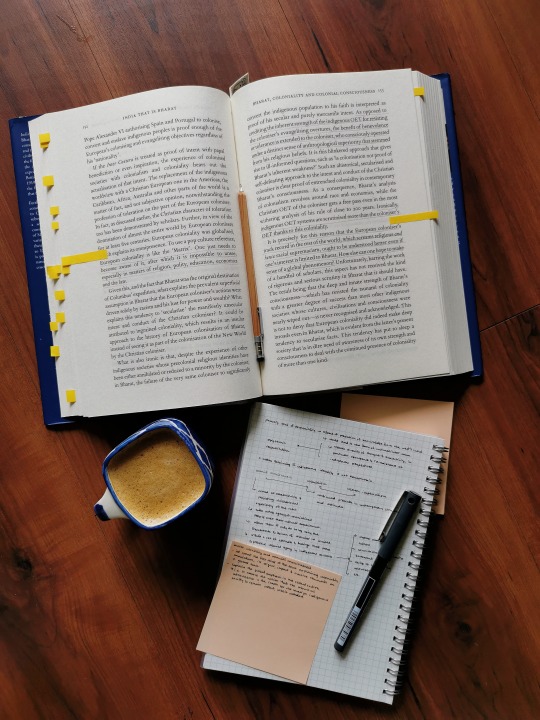
"after all, how can one feel the loss of a thing whose existence one has become unconscious to?"
a wonderful collection of essential and constant truth bombs.
#india that is bharat#j. sai deepak#indian literature#indian history#non fiction#decolonisation#indigineous people#indigenous faith#coloniality and nature#indian academia#booklr#studyblr#notes#long reads#coffee#dark academia#light academia#desiblr#study blog#book photography#vsco
1K notes
·
View notes
Text
In the 1960s, Ursula K. le Guin represented a changing of the guard in science fiction literature. She was part of a generation of novelists who questioned the colonist mindset which had influenced American sci-fi for most of the 20th century. Le Guin came to this understanding not just as a moral stance or an intellectual exercise. Issues of racism and colonialism were personal to her. This episode, originally titled "The Word For Man Is Ishi,” comes from the podcast The Last Archive from Pushkin Industries hosted by Jill Lepore and Ben Naddaff-Hafrey.
#Prologue to Ursula K. le Guin#podcast#podcasts#science fiction#imaginary worlds#The Last Archive#anthropology#genocide#books and libraries#books and reading#books and literature#museums#california#colonialism#colonization#ishi#indigenous#native american
80 notes
·
View notes
Text
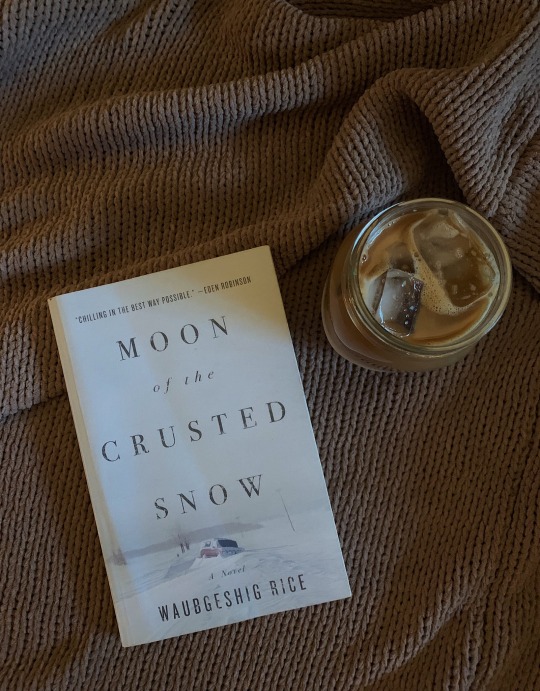
rainy morning with a good book 😌
#book tumblr#bookaholic#bookblr#bookish#booklr#books#books and literature#bookworm#book aesthetic#book blog#book photography#reading#indigenous literature#books and reading#books and coffee#bibliophile
94 notes
·
View notes
Text
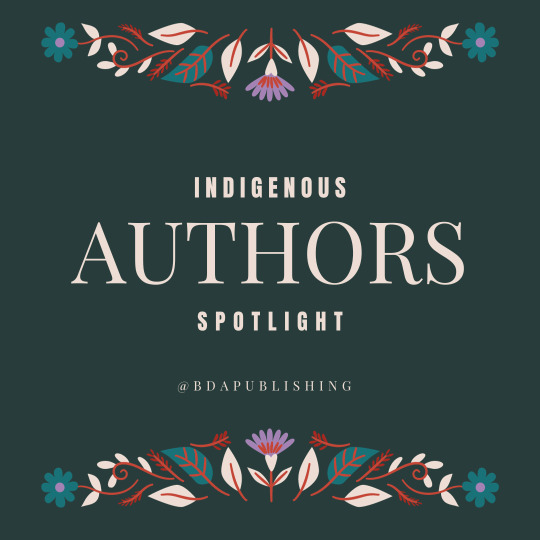
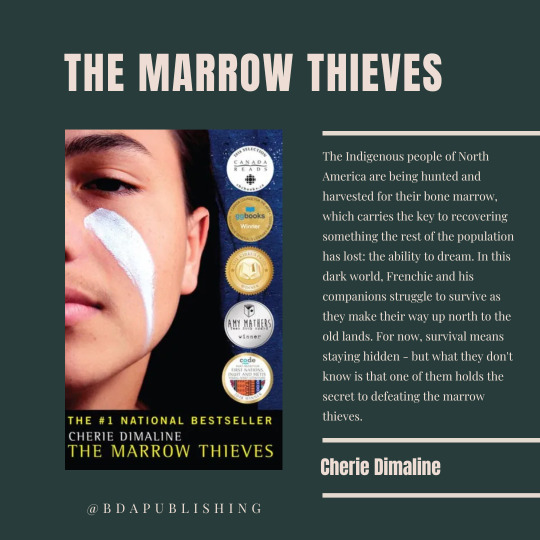
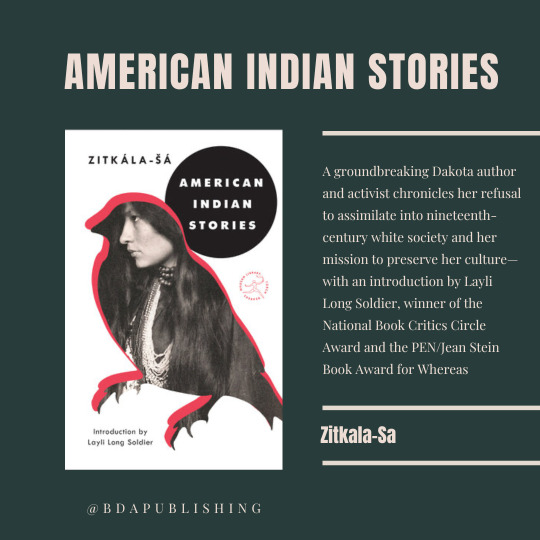
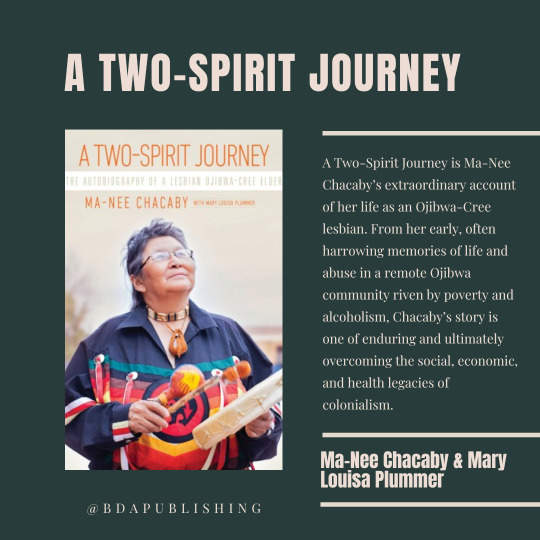
Happy Friday, Bookblr! This holiday weekend, the BDA team is honoring and amplifying Indigenous voices by showcasing four incredible authors and their powerful stories. Join us in celebrating the richness of Indigenous literature with Cherie Dimaline's "The Marrow Thieves," Ma-Nee Chacaby & Mary Louisa Plummer's "A Two-Spirit Journey," and Zitkala-Sa's "American Indian Stories." Let's carve out space for diverse narratives and gratitude for the wisdom these authors share.
#bookblr#booklover#books#books and reading#reading#bookworm#books and literature#book blog#indigenous authors#book recs#book recommendations#book cover
83 notes
·
View notes
Text
Mixing Magic and Science to Shape Dragon Breath
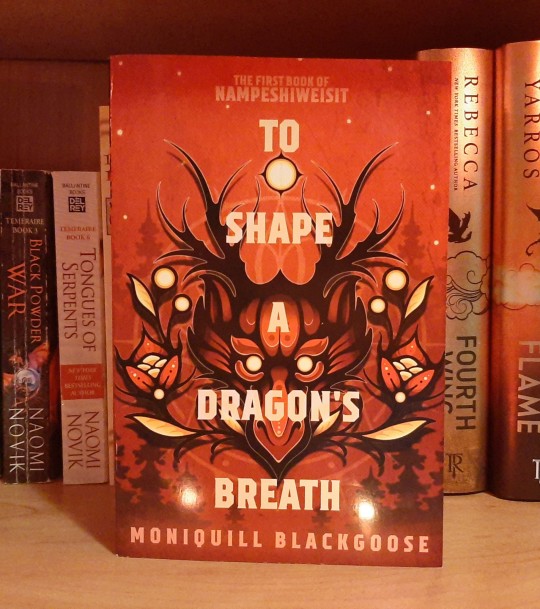
I'd be lying if I said dragons weren't my favorite magical creatures. There are literally two of them on my desk right now, and I have handed more people the Temeraire books than I care to count. That said, the vast majority of my dragon experience is with what I'm gonna call white westerner dragons. If they're not literally fantasy British, they're inspired by fantasy British dragons, and the dragon world is just a lot bigger than that. So I was absolutely delighted to find a book with a Nampeshiwe and broaden my dragon horizons. Let's talk To Shape A Dragon's Breath.
When Kasaqua chooses Anequs to be Nampeshiweisit, it is largely a matter of safety that first convinces Aneques to leave Masquapaug to learn the skiltakraft to effectively Shape Kasaqua's breath. However, this is an Indigenous woman walking into the heart of Fantasy North America with flavors of Fantasy Nordic Countries, so... colonialism, white supremacy, racism, and imperialism are massive themes and major roadblocks that Anequs experiences. And experiences again. And again. And again. From literally everyone, from her friends, to uneasy allies, to indifferent classmates to bitter enemies. The nuance and variation in the racism that Anequs goes head to head with was stunning--as in it left me absolutely stunned.
On top of that, the world is developed to the point that Frau Kuiper keeps laying out multifaceted, multi-party political issues and Anequs just keeps having to go "literally all of these perspectives share the assumption that my people are uncivilized and need either exterminating or civilizing. What if we tried assuming we are people just as civilized as you with a culture culture traditions just as deeply held?" It's amazing how many characters tell Anequs that she is rude for suggesting that she is a person. Like the number of people I wanted to punch while reading was astounding.
That said, no character in this book is a simple allegory or one-dimensional caricature. Theod Knecht was separated from his family and his people at birth and raised to believe that the other way to be a person was to be Anglish--and even then, he could never be Anglish enough to be fully human. His arc is the complicated emotions of unlearning a system that says you have no worth and reconnecting with your people.
Sander is Anglish and coded as Autistic, but he and Anequs have one of my favorite friendships in this book. They take each other day by day on their own terms and at their own paces, and honestly Sander is just a sweetheart.
Liberty is in an interesting position because she is indentured and living in an Anglish society, which prohibits same-sex relationships. Which does not stop Anequs from expressing her feelings for Liberty in ways that are safe and supportive of Liberty. These two are darling and I genuinely cannot wait to see where they go in the sequel.
Then we come to Kasaqua. Kasaqua is just literally playfulness and joy in dragon form, and she is a delight. She isnt as talkative as say Naomi Novik or Rebecca Yarros's dragons are, but she is expressive and personality-filled nonetheless. There is also her deep-seated joy at [redacted because that's kind of a major spoiler and I don't want to spoil this book].
All these relationships really form and solidify at Kuiper's Academy of Natural Philosophy and Skiltakraft, to which Anequs receives a full sholarship. The school is like a mix of senior high school and undergrad at university, since students between 16 and 20 attend. Most of the students are male, with Anequs and Marta the only female students in attendance for this book. The school is run by Frau Kuiper, who, in her day, basically pulled a Mulan/Alanna of Trebond to get chosen by a dragon, trained, and then sent to the front of a war where she distinguished herself. Her "pet project" to to use Anequs and Theod to "prove that nackies can be civilized" which is honestly pretty gross and causes a metric ton of friction between her and Anequs. In the process though, Anequs learns lessons that it is debatable whether Frau Kuiper meant to teach her that I think will let her be heard in Anglish society enough to support and preserve her people.
Overall, this book was amazing. It was HEAVY, but it needed to be, and that weight just adds to the reading experience. This is one of those books that just literally everyone should have to read at some point.
#to shape a dragon's breath#moniquill blackgoose#anequs#kasaqua#indigenous literature#indigenous main character#indigenous dragons#dragons#books and reading#books and novels#books#books & libraries#book recommendations
45 notes
·
View notes
Text
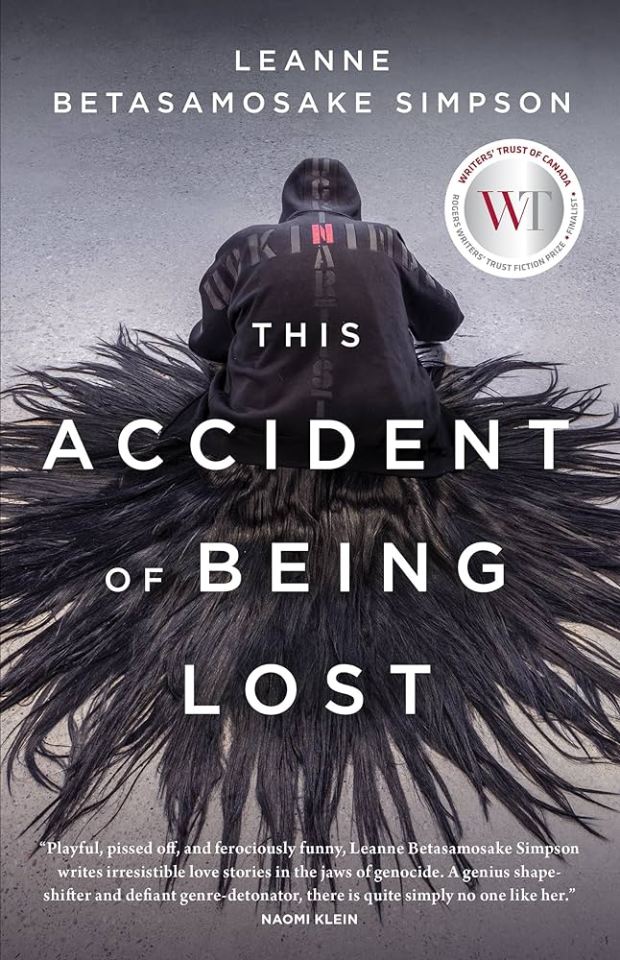
#short story collections#short story collection#the accident of being lost: songs and stories#leanne betasamosake simpson#21st century literature#canadian literature#indigenous literature#mississauga literature#english language literature#have you read this short fiction?#book polls#completed polls
24 notes
·
View notes
Text
i really think the latino purists are so fucking dumb. a while ago i expressed wanting to reconnect to my indigenous heritage as a mexican person because i believe reconnecting and honoring indigenous ancestry is critical to decolonialism. and what did i get? a bunch of latinos angry as fuck because I dont “look” indigenous or that i’m too white to be indigenous, or that im just a byproduct of United Station culture and that Im a watered down mexican. Turns out from a recent dna test that almost half of my makeup is indigenous american, both Native North and Mexican indigenous. Of course the other half is portugal and Spain, but holy fuck was I happy. Finally I know that I can make the first steps to honoring that part of my ancestry, even if I will never find out what tribe or groups of indigenous people my family is from. the point is that im making those first steps, and I genuinely believe decolonization starts with learning about any and all indigenous ancestry that you may have within your family. Even if that ancestry is not positive, whether from colonization or slavery. Having that knowledge is powerful, knowing the tribes, learning their names, how to pronounce it correctly, familiarizing yourself with that culture...how is that not more important to other latinos? we come from colonization, and we seriously have to start joining our indigenous communities in honoring their presence now and in the past.
#like how r u gonna b latino and not try to learn ur indigenous ancestry#like dude thats you too!#the anti indigenous sentiments are huge in lat am either way#colorism and anti indigenous....spanish purists hating indigenous dialects or hating any change to the spanish language#like dude spanish was not the first language here first off#second off go read some spanish literature and history#transphobes dont annoy me but dumbass latinos do#like damn im rooting for us but youre making it really fucking hard#but all of the indigenous people and indigenous latinos i talk to...like we vibe and we're just trying to reconnect and honor#literally the bare minimum#and yall get mad#literally so annoying
186 notes
·
View notes
Text


damn
#dark academia#da#academia#literature#art#text#quote#from reading for my canadian indigenous literatures class#when your compulsory reading sends you into an existential crisis#love to see it#meaning of life#existential dread#I have to have something playing at all times otherwise I can feel myself slipping#my brain is a menace#on silence#and needing to fill it up
9 notes
·
View notes
Photo
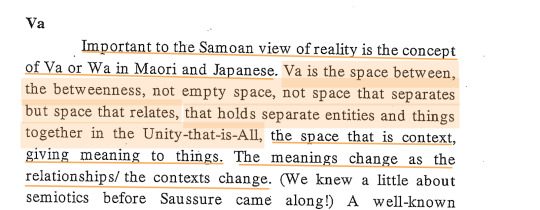
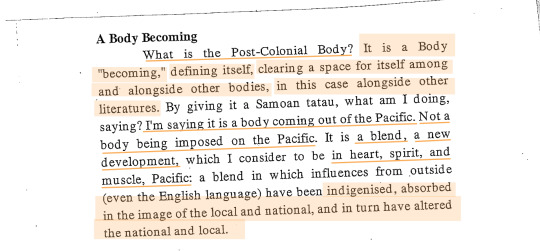
— ALBERT WENDT, ‘Tatauing the Post-Colonial Body.’
my nb immigrant ass jumped for joy reading this....
#the hau'ofa excerpt is gaining notes again#so im processing old uni readings from 2022#literature#oceania#albert wendt#.jpg#pasifika#indigenous#quote#quotes#lit
17 notes
·
View notes
Text
mihkokwaniy
by joshua whitehead
mihkokwaniy
my kokum has many names:
the indian woman
the whitehead lady
a saskatoon female
but my favourite is:
the beauty queen;
they never meant to call her beautiful
what they meant by beauty was:
cheapdirtybrownprostitutedrugaddictalcoholicfirewaterslut
when they write:
“an indian about 35 years old
naked from the waist down
died from asphyxiation
at the queen’s hotel
effects of alcohol
&sedatives”
they don’t mean beauty as in:
mino iskwēw
or: “pleasing the sense or mind aesthetically;
of a very high standard; excellent”
what they mean is
she is beautiful for a squaw in ‘62
she pleases the body
of white men who burn in the loins
for the teal-shade of a browning bruise;
when i type into google
“how to say beautiful in cree”
i get: shaoulle
& when i type that into google i get:
“brutal murder-sex assault case”
seeRE:rinelleharpercindygladuetinafontaine
that’s my grandmother:
she is a mino iskwēw
the beauty queen
a woman with a name:
rose whitehead
&shediedbecauseofit
i read somewhere that saskatchewan
is an economic machine
for producing rape—
seed&honey
& in tisdale you can buy a mug that says:
the land of rape and honey
that’s where my kokum is buried
& her grave is a modest little place
where rabbits visit & sometimes chew
where little dandelions bloom
grant wishes to the wind
to her children who are scattered
across the plains of kanata
looking for a quick fix
& for anger to heal
or at least amend
like it does for a judge
who gifts a man six years
for the death of three women;
i think of my nôhtâwiy
her son who lost his name to a polish man
& felt the sting of day schools
even if priests beat & made honey
with their fists smooshed
into the sweet rot of little brown boys
who liked hockey & lived in suburbs
with whites who made them wait
in the freezing cold
& broke their noses on the ice—
but you’re still not ready to apologize
for that just white yet
my kokum has made many headlines:
“woman found strangled”
being the most consistent
a fifty word article that calls for sympathy
not for the “strangulation death
of the whitehead woman”
but for the man:
steven kozaruk of esterhazy
who “was suffering from the effects
of alcohol and sleeping pills”
even with a “seven-man jury”
& “thirteen witnesses,” lives—
his whiteness is his weakness
(even if its biceps can crack a brown neck like a wishbone)
and that weakness is his innocence;
the life of my kokum is worth:
six years & fifty words;
all these things overlap
interweave, interlay, interplay, interact
penes
|inter|intra|
|probo|capio|vita|
terra|corona|letum|nullius
tansimaslow
my kokum is famous
a real holly golightly
i bet she even eats
fried bologna sandwiches
at tiffanys
aint that right gran?
when i visit your grave
in saskatoon
i see the face of kozaruk
on the prairie scene
fatteninginsuburbia
& here you are
with a rag-tag little monument
made of sticks & leaves
stems from jackrabbits
that seem to visit often
a little blue ribbon
god knows from who
& a sad little brown boy
with a million questions like:
how are you doing?
do you hate klik too?
what would life have been like
if you had lived beyond thirtyfive?
would i be alive?
would the cancers in my dad
not have crept & lived
spelled doom on his skin?
would i be able to speak cree
without having to google translate
this for you?
would you make me cookies
& teach me how to sew back on the limbs
to my plush rabbit floppy ears?
would you call me “m’boy?”
& take me to sundances
powwows, bingo nights too?
would you make sure i feed the rez dogs
when they all come around?
would you make me a jingle dress
cause i want to be a pretty dancer like you—
would you teach me what it means to be two-spirit
tell me i can be a beautiful brown boy in love?
make me say niizh manitoag—feel the power on the tongue?
would you teach me to knead bannock
make life from lard—
a real ratio for reckoning?
hi kokum?
can i call you on the phone?
i promise not to call collect
i just want to hear your voice
tell you i learned what it means
to say i love you
& feel the whole of cree
coalescing in my breath:
kisâkihitin; my god, kisâkihitin
hey gran?
can i ask you something quick?
are you okay up there in godknowswhere?
do you see what we’ve all done?
my dad says these things all happen for a reason
that i wouldn’t be here if they didn’t
hey gran?
i’m sorry—
you know that right?
did you have to die for me to be alive?
heygranheygranheygranheygran
i’ll let you be
& stop being sick’ning
i bet you’re busy
cooking macaroniandtomatosoup
for twelve hundred missing & murdered women,
girls & two-spirit folk
it’s just, am i supposed to hate him, gran?
tell him that with one death
he ruined the lives of an entire family?
i want to tell him that the life of a person
is an archive of memory
& when you he strangled the life out of you
in a queens hotel shoddy little bed
the last gasping breath you exhaled
held in it little particles
fragments of time:
a bay leaf boiling in tomato sauce;
a flake of tuna that a
cat named randy
licked&licked&licked;
the soft cry of a baby boy
plummeting into day;
the smell of sweet grass smudging
monsters from our bedrooms;
tell him: when you kill a memory
you snuff out metaphor
turn off the light in a home;
you destroy a world where children
are nursing still&still;
—& aint that the hardest truth?
to be honest
i’m no aeneas
no marvellous country house poem
no faeryland, no golden world
no chimeric homeric epic
i’m just a little brown boy
queered by his colour
writing for a kokum he’s never met;
but i promise you:
these spaces can transform
an injun into a warrior
who can claw, scrape, fight
who can write on a piece of paper
sign a name instead of an ‘X’
that says, “this is my kokum
& her name is Rose Whitehead;
and she is
beauty queen extraordinaire.”
I dedicate this poem to all missing and murdered Indigenous women, girls, and two-spirit peoples; for their families, friends, loved ones, and kin. We are a collective trauma that demands to be examined, reconciled, resolved, and healed.
Today we survive; tomorrow we resist.
#i need everyone to read this#i'm in vancouver and i didn't bring my copy of full metal indigiqueer so i can't read this in the physical form#but being in vancouver feels so heavy because there is so much loss#vancouver and winnipeg are big for mmiw unfortunately#poetry#indigenous poetry#literature#full metal indigequeer#joshua whitehead#cree#oji-cree#art#indigenous art#indigenous authors#book reccomendations
12 notes
·
View notes
Text
In this article I demonstrate how in the post-Thaw period—the period of “soft” socialist realism—the northern indigenous minorities began to (re)invent literary writing and manifest their own version of the canon. Due to the lack of a pre-Soviet written literary tradition, “young” literatures were born as a symbiosis of folklore, beliefs, indigenous-Christian customs and the surrogate literary tradition of the Russian-European center: the Soviet “master plot.” Having graduated from universities in Moscow or Leningrad, the first generations of writers “(re)invented” a view of themselves as simultaneously native and Other. A consequence of the fact that the authors internalized the role of the youngest “brother” was, among others, the amalgamation of children's and adults' narrative and pedagogical zeal, which combined folklore ethics with socialist realist moralism. The study is of a transitional time: before the local authors had experienced a cardinal reevaluation of their values during perestroika and afterwards.
1 note
·
View note
Text
A mind-bending, gripping novel about Native life, motherhood and mental health that follows a young Mohawk woman who discovers that the picture-perfect life she always hoped for may have horrifying consequences
On the surface, Alice is exactly where she should be: She’s just given birth to a beautiful baby girl, Dawn; her charming husband, Steve is nothing but supportive; and they’ve recently moved into a new home in a wealthy neighborhood in Toronto. But Alice could not feel like more of an imposter. She isn’t connecting with Dawn, a struggle made even more difficult by the recent loss of her own mother, and every waking moment is spent hiding her despair from their white, watchful neighbors. Even when she does have a minute to herself, her perpetual self-doubt hinders the one vestige of her old life she has left: her goal of writing a modern retelling of the Haudenosaunee creation story.
At first, Alice is convinced her discomfort is of her own making. She has gotten everything she always dreamed of, after all. But then strange things start happening. She finds herself losing bits of time, hearing voices she can’t explain, and speaking with things that should not be talking back to her, all while her neighbors’ passive-aggressive behavior begins to morph into something far more threatening. Though Steve assures her this is all in her head, Alice cannot fight the feeling that something is very, very wrong, and that in her creation story lies the key to her and Dawn’s survival. . . . She just has to finish it before it’s too late.
Told in Alice’s raw and darkly funny voice, And Then She Fell is an urgent and unflinching look at inherited trauma, womanhood, denial, and false allyship, which speeds to an unpredictable—and surreal—climax.
#new book#new books#read this#books and reading#books and writing#books and authors#books and libraries#books and literature#indigenous#indigenous writers
4 notes
·
View notes
Text
The Sentence
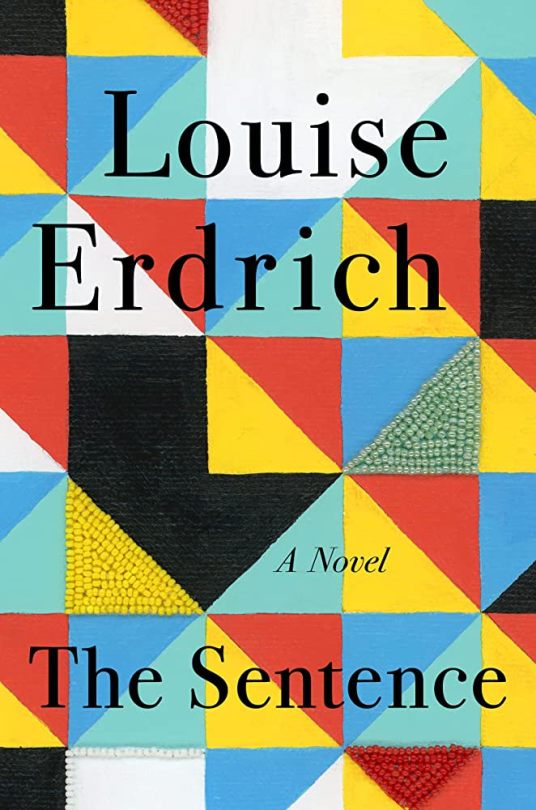
The Sentence by Louise Erdrich
it feels almost criminal that i have waited this long to read any Louise Erdrich. her work has been in my periphery since 2004, when my best friend wrote heavily about one of her books for her undergraduate thesis (sorry B, i still haven't read The Last Report on the Miracles at Little No Horse). i picked up this one earlier this year, when i was only just getting back into reading more regularly, because (i'm pretty sure) that same friend recommended it, and i love ghosts.
this book contains so much, and somehow still feels so simple and straightforward. like, of course, perfectly ordinary for Tookie to help a crush by transporting a body, who hasn't laughed at greeting card that promises the same? totally expected for the justice system to work against and incarcerate an Ojibwe woman, and just totally normal life stuff for her to marry the former cop who arrested her after she gets out and then have a fraught relationship with his grown daughter and surprise grandchild. and come on, what indigenous-owned independent bookstore isn't haunted by the ghost of a regular customer, especially during early COVID-19, in Minneapolis, amid the grief and rage following the murder of George Floyd?
SO MUCH HAPPENS in this book, but it's all narrowed to Tookie's pov--her own very personal and specific wants and fears, her struggle and belief. it's beautifully done, so delicately balanced, a book that fills you like a warm meal even as you're crying and remembering what you felt like sitting in bed and looking out the window and wondering when you would ever feel safe out there again. i hesitate to call it magical realism, even though i think that's where it falls in the range of "kinds of books i like," because Tookie presents every event as equally real--and in February of 2020, i would have thought a worldwide pandemic and indefinite lockdown just as unlikely as a retail ghost and the otherworldly power of an old book (which is to say, all things i could imagine happening but had never happened to me personally). magnificent.
the deets
how i read it: as an ebook from the library, via Libby! this was at a time when i hadn't yet gotten back into the habit of reading and so frequently forgot to go back to books i was in the middle of, but this one was so compelling i actually finished it before it was due.
try this if you: are ready to process some of that 2020 terror, love a main character whose flaws are part of her charm, want a book with a majority native cast of characters, or just want to hang out in somebody else's weird life for a while.
some memorable moments: i read this a while ago and no longer have it handy to quote, so this is a fun test of my bad memory! there were a lot of scenes i really liked that i can recall, but one that sticks out as very charming to me was when Tookie's artist coworker at the bookstore closed herself in a repurposed confessional booth to decorate the inside, got a little high on the glue, and in this altered state confirmed Tookie's suspicion that a former customer was haunting the store. I loved everything about this; the slightly weird artsy coworker, the confessional in the bookstore (based, i presume, on the one that lives in Erdrich's store, Birchbark Books), the triumph of having someone validate your ghost theory and the tragedy of wondering if it's just because she's been breathing glue fumes.
also, i just love so so much that Louise Erdrich wrote herself into her own book, as the owner of the bookstore in the book which is not quite, but almost, her own bookstore in real life. please i want to just chat with her for several hours, what a mind.
2 notes
·
View notes
Text
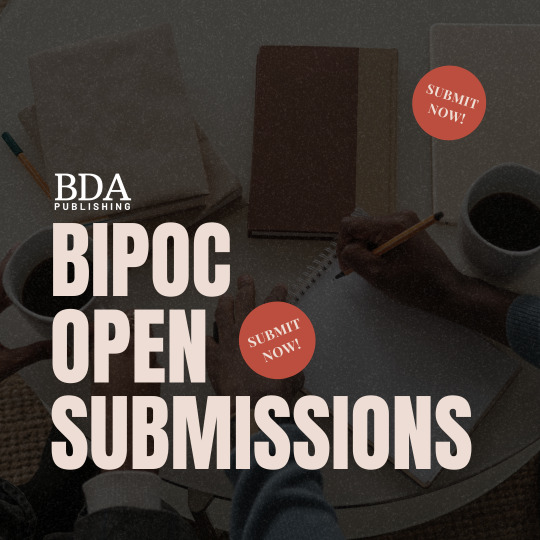

At BDA Publishing, we're on a mission to amplify diverse voices and break barriers in the publishing world. Submit your manuscript to our open call and be part of reshaping the narrative. We're seeking originality, strong character development, engaging narratives, unconventional themes, and experimental styles—all under 80k words. Your story matters—let's make it heard!
Click here to submit your manuscript. Please allow a 6-week reading period for our editing team to evaluate your entry. Contracts are awarded on a rolling basis and subject to our discretion.
#bookblr#book blog#books and literature#indie publishing#indie author#booklover#books#books and reading#bookworm#reading#bipoc authors#bipoc author#call for submissions#fringe authors#indigenous authors
6 notes
·
View notes
Text
Sometimes You Grow Into Your Books
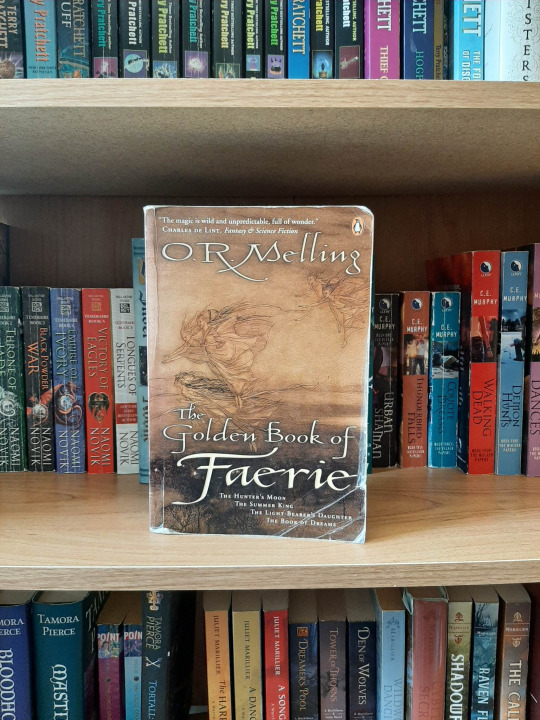
I was objectively too young when I picked up this book at like, ten or eleven, having just read Terri Windling and Ellen Steiber's The Raven Queen and wanting more faeries with some edge to them, and read my way through four novels about magic and fairies in Canada and Ireland. On that first read, solidly 80% of it went straight over my head, and I couldn't figure out why. (Reader, the reason is because I was a tiny human who was still at a middle grade level and this book is pretty firmly YA but literally nobody ever told me no where books were concerned--and thank you to everyone who supported my reading from a young age!) That said, there was something about the book that wouldn't stop worrying at the back of my mind, so over the next three years, I kept reading and rereading, and slowly the stories took shape in my head and I learned why the books stayed with me. I spent a long time with this book, so let's talk The Golden Book of Faerie.
This is a spoilery post, so be aware if this book is for some reason on your TBR!
A word I didn't know when I decided I wanted to read this book is omnibus, but that's what this book is--an omnibus edition of four OR Melling novels.
The Hunter's Moon is the first of the four books, and it really sets up the complex relationship between family and faerie that will permeate the rest of the books. It follows Gwen and Findabhair's (fin-ah-veer's) reunion in Ireland after a while apart, and Findabhair's entanglement with Finvarra, a faerie king. Finvarra either falls in love with/selects for the Hunter's Moon sacrifice Findabhair, and Findabhair decides she is in love enough to go through with it. Gwen basically decides that no, this is not acceptable, and finds help fron Dara, cute guy and folkloric king of Ireland; Granny (Grania Harte, not Granny Weatherwax) who is a fairy doctress; Katie Quirke, who is a farmer with big dreams; and Mattie O'Shea, a middle-aged Managing Director of a firm who is also a married new dad. I would be absolutely remiss to point out the resemblances to Lord of the Rings here, because Gwen quite literally pulls together a fellowship to try to save Findabhair and faerie.
The fellowship faces down Crom Cruac, the Great Worm. It...does not go great. I wasn't kidding when I made the LotR comparison, there is no great, glorious, heroic battle at the climax of this book. They are overpowered and beaten to a pulp, and Findabhair gets Laterose-ed into the ground, and suddenly the company's reason for fighting lies dying. Finvarra chooses a heroic sacrifice, and the rest of the company takes itself home to recover. A year and a day later, the Company of Seven gather again to mark to day, and Finvarra--a notably human Finvarra--returns.
The overarching mood of this story is of how love and grief intertwine, and it is really truly well done.
The Summer King shifts protagonists to focus on Laurel and Honor Blackburn, a pair of twin sisters violently separated by what seems, on the surface, to be a hang-glider accident. We find later that it was, in truth, a faery attack, but for the long year between Honor's death and Laurel's introduction to Faery, all Laurel knows is that her sister is dead. And the kicker for the family--although this is implied rather than stated explicitly on page--is that they didn't even have a body to bury because Honor crashed into water, and the glider took her too far down to be recovered.
Along for the ride with Laurel is Ian Gray, troubled young pastor's son and the new--and EXTREMELY reluctant--Summer King. He and Ian more share a body and mind than are the same person, so poor Ian is fighting a massive battle and Laurel is still so wounded by Honor's death. The pair bond a bit on Grace O'Malley's ship, and even when it is revealed that Honor was a casualty of the Summer King's violence, Laurel and Ian still work together to light the midsummer pyre and keep the human and faerie worlds together.
Dead is dead in the human world still, so Honor cannot return to her life. But thanks to Laurel, she can live on in Faerie. And Laurel also grows enough to pull Ian back from the edge as well.
So as the eldest of three girls, literally the worst thing I can imagine is losing a sister, so this book made me SOB. But the compassion required for forgiveness and healing stuck, and the book expands the theme of the intertwining of love and grief while giving it some nuance and complexity by weaving in compassion and forgiveness.
The Light-Bearer's Daughter is possibly the closest thing to a traditional "fairy tale" in this book, because Dana is all of eleven in this book, far younger than the teen protagonists of the last two. That is why when Dana stumbles ass-backwards into the woods and is handed a mission by the Summer Queen--none other than Honor Blackburn, for those of you playing along at home--she ends up terrifying her single dad by bailing on him right before a move from Ireland to Toronto to complete her mission.
This book is very much a fairy tale because it's Dana learning, growing, getting square with the fae mother who left her and her father, and then accepting the move to Canada. This is possibly my least favorite of the three novels, but it's important background for Dana for the next book.
The Book of Dreams takes Dana as its protagonist again, but now she is a troubled thirteen who has not adjusted to life in Toronto. It also weaves in the major players from the three previous books, because whether Dana is ready or not, something big enough to threaten the existence of faerie is coming, and Laurel and Gwen need to make sure that this teenager survives to battle this.
The best part of this book is how the mythology and lore expands. We get the Irish/English faerie lore that we've been accustomed to in three previous books, but thanks to the multiculturalness of Toronto, we also get First Nations and Indian (that's as in India, not as in Native American) lore as well, and the three work together beautifully. This was the first time I had ever seen Irish and North American Indigenous mythologies together, but CE Murphy does a version of it in the Walker Papers, and these two seem to work together really well.
I also love the way the different threads of this book weave together, although we are never free of the balance between love and grief and the costs of having a foot in both the mortal and faerie worlds.
Overall, despite being objectively too young for this book when I first picked it up, it was foundational in shaping what I prefer in faerie stories (and actually probably explains part of why how the fae in the Dresden Files are handled pisses me off) and it really helped show me that there was nothing that was too hard for me to read. It might take spending some time with a text and rereading and reflection to parse my responses, but this book really was my first experience with a challenging text that I had to work to really get through, understand, and appreciate.
It's the combination of the lesson on how to approach challenging texts and the vibes that I learned to appreciate that really made this book stick with me, and I adore The Hunter's Moon unreasonably.
#faeries#fae#or melling#the golden book of faerie#ya fantasy#ya fiction#canadian literature#irish literature#indigenous literature#books and reading#books and novels#books#books & libraries#book recommendations
6 notes
·
View notes
Text
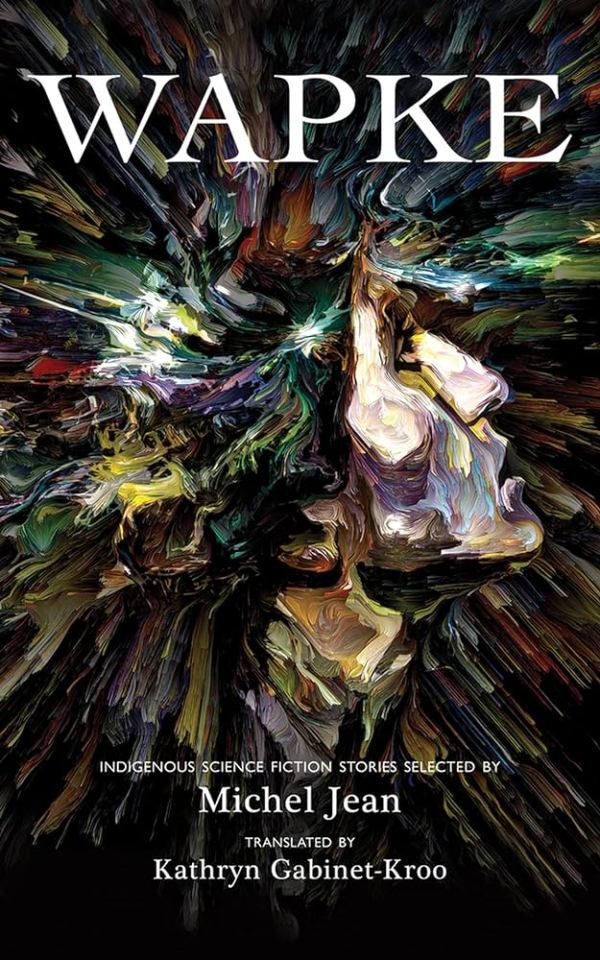
#short story collection#short story collections#wapke#wapke: indigenous science fiction stories#michel jean#various authors#indigenous literature#canadian indigenous literature#indigenous canadian literature#french language literature#21st century literature#have you read this short fiction?#book polls#completed polls
14 notes
·
View notes